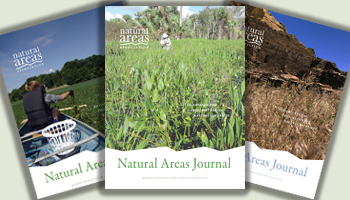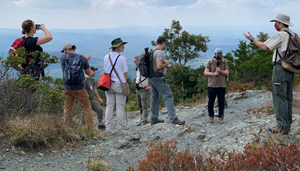The Natural Areas Association (NAA) serves scientists and practitioners focused on the management of ecologically significant natural landscapes with the intent to protect biodiversity in perpetuity. Protecting nature requires quality science, evidence-based practice, and reliable resources to inform on-the-ground practices that can advance the conservation and stewardship of land and water biodiversity. NAA curates and shares relevant and timely programs and resources with practitioners responsible for the ecological resilience and protection of natural areas.
When it comes to conservation, acquiring land or putting it under conservation easement is only the first step. The protection of natural areas demands careful planning, regular monitoring, and constant vigilance. Long-term protection includes intervention against threats that imperil the ecological biodiversity and the restoration of species that are waning or have been lost in a particular ecosystem. Protecting ecologically significant landscapes in perpetuity requires skilled practitioners, innovative research and an ongoing investment of time and resources.
Success in land and water conservation is only realized when those who manage the land have access to timely, relevant, and effective research, strategies and methods. It was this truth that led George B. Fell to establish NAA in the early 1970s, which led to the first Natural Areas Conference 50 years ago in October 1974 and remains NAA’s mission today.

"We who work in the natural areas preservation movement have a noble cause. Almost nobody before us had seen the need or been able to set aside natural areas. And those that follow will no longer have the chance. They will only be able to care for what we leave them." — George B. Fell, founding member of NAA
Managing ecologically significant landscapes for the protection of biodiversity is a specialized segment of conservation and ecological science that includes management strategies to avert the permanent loss of or degradation of rare species and preserve the unique functions of natural communities. Beyond the benefits to nature, well-managed natural areas increase resilience during catastrophic events and thus play an important role in the causes and consequences of climate change.
NAA provides science-based content for natural area practitioners and researchers seeking applied science, practical solutions, and knowledge transfer related to the management of natural areas on a day-to-day basis. These include land stewards in land trusts, nature centers, and nature preserves who manage land for their conservation or natural area values.
 The NAA Natural Areas Journal
The NAA Natural Areas Journal  2022 Virginia Stewardship in Action Field Workshop
2022 Virginia Stewardship in Action Field WorkshopNAA shares a suite of programs, products, and services that offers a broad spectrum of current and emerging issues, methodologies and best practices in multiple formats for busy practitioners. The programs are designed to encourage practitioner participation and achieve on-the-ground outcomes for ecological protection.
The Natural Areas Association's vision is broader and better protection of the world's natural areas. This vision includes: the expansion of existing protected areas, the creation of new natural preserves, adequate resources to protect natural areas into the future, increased recognition and appreciation for the beauty and value of nature, and establishing conservation priorities based on sound science.
NAA is an equal opportunity employer that does not discriminate on the basis of race, religion, color, national origin, age, gender, gender identity, disability, citizenship status, genetic information, sexual orientation, or on the basis of any other federal, state, or local legally protected status. NAA management is dedicated to fulfilling this policy to include, but not limited to, the board of directors, staff members, association members, partners, sponsors and anyone else who engages with the organization.
Support the people who manage our natural areas and protect biodiversity in perpetuity.